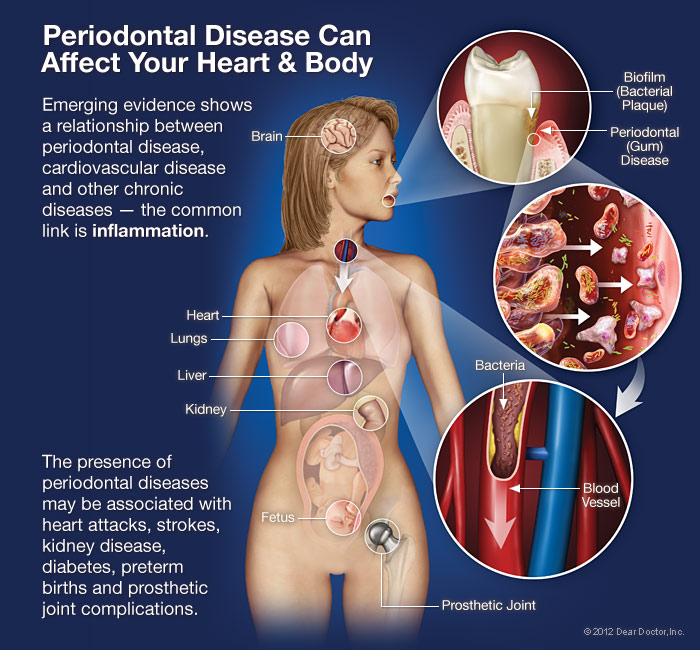
Introduction
Gum disease, also known as periodontal disease, is a common oral health issue that affects millions of people worldwide. It is characterized by inflammation and infection of the gums, which can lead to various complications if left untreated. However, what many people may not realize is that gum disease is not just limited to oral health problems. Research has shown a strong connection between gum disease and overall health, highlighting the importance of maintaining good oral hygiene. In this blog post, we will explore the link between gum disease and your overall health, shedding light on why taking care of your gums is crucial for your well-being.
1. Understanding Gum Disease
Gum disease, also known as periodontal disease, is a common oral health condition that affects the gums and supporting structures of the teeth. It is primarily caused by the buildup of plaque, a sticky film of bacteria that forms on the teeth.
2. The Link Between Gum Disease and Overall Health
Research has shown that gum disease is not just limited to the mouth; it can have a significant impact on your overall health as well. Several studies have found a strong connection between gum disease and various systemic conditions.
2.1 Heart Disease
Studies have suggested that gum disease may increase the risk of heart disease. The bacteria present in the gums can enter the bloodstream and contribute to the formation of plaques in the arteries, leading to atherosclerosis.
2.2 Diabetes
People with diabetes are more prone to gum disease, and gum disease can also make it difficult to control blood sugar levels. The relationship between gum disease and diabetes is bidirectional, with each condition exacerbating the other.
2.3 Respiratory Infections

Poor oral health, including gum disease, can increase the risk of respiratory infections such as pneumonia. The bacteria from the mouth can be inhaled into the lungs, causing infections and inflammation.
2.4 Pregnancy Complications
Pregnant women with gum disease are at a higher risk of premature birth and low birth weight. The inflammation caused by gum disease can trigger an immune response that may interfere with the development of the fetus.
2.5 Rheumatoid Arthritis
Research suggests that there is a link between gum disease and rheumatoid arthritis. The bacteria associated with gum disease can activate the immune system and contribute to the development and progression of arthritis.
3. Preventing Gum Disease
Preventing gum disease is crucial for maintaining both oral and overall health.
Summary
Gum disease is more than just a dental concern; it can have a significant impact on your overall health. Numerous studies have found a strong association between gum disease and various systemic conditions, including heart disease, diabetes, respiratory infections, and even certain types of cancer. The underlying mechanism behind this connection lies in the chronic inflammation caused by gum disease, which can spread throughout the body and contribute to the development or worsening of other health issues. Additionally, individuals with compromised immune systems, such as those with diabetes or HIV, are more susceptible to gum disease and its complications. Therefore, maintaining good oral hygiene practices, such as regular brushing, flossing, and dental check-ups, is essential not only for a healthy smile but also for overall well-being. By preventing or treating gum disease, you can reduce the risk of developing or exacerbating other health conditi visit site ons. Remember, your oral health is an integral part of your overall health, and taking care of your gums is a vital step towards a healthier life.
- Q: What is gum disease?
- A: Gum disease, also known as periodontal disease, is an infection of the tissues that surround and support your teeth.
- Q: How does gum disease affect my overall health?
- A: Gum disease has been linked to various health conditions, including heart disease, diabetes, respiratory infections, and even certain types of cancer.
- Q: What are the symptoms of gum disease?
- A: Common symptoms include swollen or tender gums, bleeding gums during brushing or flossing, persistent bad breath, receding gums, and loose teeth.
- Q: How can I prevent gum disease?
- A: Maintaining good oral hygiene practices such as regular brushing, flossing, and visiting your dentist for check-ups can help prevent gum disease. Avoiding tobacco use and maintaining a healthy diet are also important.
- Q: Can gum disease be treated?
- A: Yes, gum disease can be treated. The treatment options depend on the severity of the disease and may include professional dental cleaning, scaling and root planing, medication, or in severe cases, surgery.
- Q: How often should I visit my dentist?
- A: It is generally recommended to visit your dentist every six months for regular check-ups and cleanings. However, your dentist may suggest more frequent visits if you have gum disease or other oral health concerns.

Welcome to my website! I’m Timothy Martens, a dedicated and experienced Periodontist specializing in dental braces, gum disease treatment, dental scaling, and toothpaste recommendations. With a passion for oral health and a commitment to providing exceptional care, I strive to help my patients achieve healthy and beautiful smiles.
